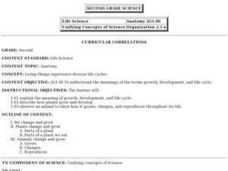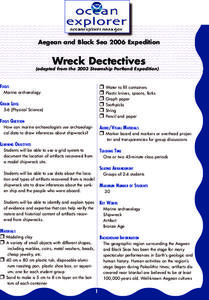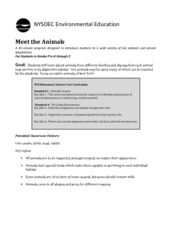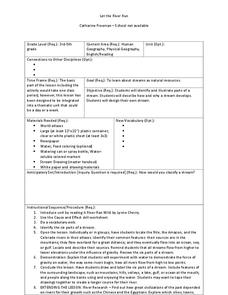Curated OER
What's a Capacitor?
Students explain concepts of charge storage, how a capacitor works and how DRAM uses capacitors to store memory. They construct a capacitor and use a multimeter with capacitance meter capability to measure the stored charge in the...
Curated OER
The Wonderful World of Slugs
Examine a slug? Of course, what else would a 2nd grader do with it? Pupils use clues and go on a slug hunt, read a slug story, or make a cooperative group mural of a slug's habitat. While older learners catalog slugs, go on a slug hunt,...
Curated OER
Variation in Human Skin Color
Students explore factors that control variation in human skin color and the implications of this information for human society. They understand that skin color is no longer considered a credible scientific standard by which to classify...
Curated OER
Electronic Components
Learners describe how resistors affect the flow of electricity. In this electronics lesson students examine transistors and what they do and how they work.
Curated OER
Benefits, drawbacks of alternative healing
Students discuss alternative healing techniques, then chart the potential benefits and drawbacks of alternative health therapies. They design symbols representing alternative healing techniques.
Curated OER
Sunburns and Sore Muscles: Working to Save the Farm During the Great Depression
Fifth through eighth graders engage in a lesson in which they study working class people during the Great Depression. They work to develop an understanding of the economic developments in Arkansas during the 1930's. Learners access...
Curated OER
Living Things Experience Diverse Life Cycles
Second graders will study and explain the meaning of growth, development, and life cycle. They describe how plants grow and develop and observe an animal to show how it grows, changes, and reproduces throughout its life.
Curated OER
Amazon Food Chain
Explore food chains in the Amazon Rainforest using this resource. Learners discuss the predator vs. prey relationships in the food chain. Then, they create a food web to describe this relationship. This is a simple and effective way to...
Curated OER
Costa Rican Food Chain
Discuss the animals and plants in the rainforest food chain using this lesson. Learners talk about and do research on the top predators from the Costa Rican region and create a model of one of them in class. They also make a visual model...
Curated OER
Leach Out and Touch Someone
Students discuss how groundwater becomes polluted. In groups, they design and create models of groundwater pollution sources. They demonstrate to the class how the water may become contaminated from local and nonlocal pollution sources.
Curated OER
Migration Activation
Young scholars play the role of migrating birds. As a class, they simulate a migration of birds to one place and back again. They relate their habitat size and changes to their current population numbers. They discover the many dangers...
Curated OER
Urban Ecosystems 2: Why are There Cities? A Historical Perspective
Second in a series of five lessons, this instructional activity encourages preteens to consider cities as urban ecosystems. First, they keep a food diary for a few days. They visit the Natrional Agricultural Statistics Service website...
Curated OER
Basic Needs of Living Things - Lesson Two
Fourth graders study and identify the basic needs of a variety of organisms. Terrariums and aquariums are used to demonstrate what plants, animals, and fish need to stay alive. These two classic models are used to effectively convey what...
Curated OER
Wreck Detectives
Junior archaeologists examine types of artifacts from the Bronze Age on the internet. In collaborative groups, they create a story about a ship from this period and then construct a model of the ocean floor after their ship has sunk....
Curated OER
Forest Communities
Students identify tree specimens. In this tree specimens lesson, students collect different parts of a tree from the areas around the school or their home. They then work in groups to create booklet that identifies tree...
Curated OER
Meet the Animals
The class will examine a series of live or stuffed animals in order to learn how different animals survive in distinctive habitats. As they examine each animal, they will be asked a series of critical thinking questions geared at getting...
Curated OER
Wildlife Conservation I
Focusing on the wildlife in their area, learners identify endangered and threatened species and what these animals need to survive. While this lesson involves animals in the Long Island area, it could be adapted for use with any area.
Curated OER
Wildlife Conservation III
Discuss the importance of wildlife conservation. Learners talk about the animals and plants on the US Fish and Wildlife Services list of endangered and threatened species. Then, they engage in a detailed discussion of the reasons these...
Curated OER
Bye-Bye Bison
Fourth graders investigate the bison's struggle for survival. They discuss the importance of bison while participating in an role playing activity showing how important the food supply and surroundings are to their survival.
Curated OER
Properties of Liquids
Students describe properties of liquids and use descriptive language as a springboard to develop precise vocabulary for properties of liquids. They also use vocabulary as practiced with liquid-vocabulary card games. Finally, students...
Curated OER
Dinosaur Vocabulary 2
In this dinosaur vocabulary skills worksheet, students match the 11 listed dinosaur-related terms to the appropriate sentences that describe each of them.
Curated OER
Let the River Run
Students explore the environment by reading a story in class. In this water formation lesson, students define environmental terms such as rivers, streams, gulf, oceans and lakes. Students read the story A River Ran Wild and discuss the...
Field Museum
The Case of Darwin's Finches
One of the most striking pieces of evidence for Darwin's Evolution of Species was his observations of finches and how their beaks differed from island to island, depending on their primary food sources. So what would happen to the theory...
New York City Department of Education
Egypt
This six-week unit encompasses all subjects with a focus study on world history and the development of ancient civilizations. As gifted and talented students dive into the interesting yet challenging topic of Egypt, they...

























